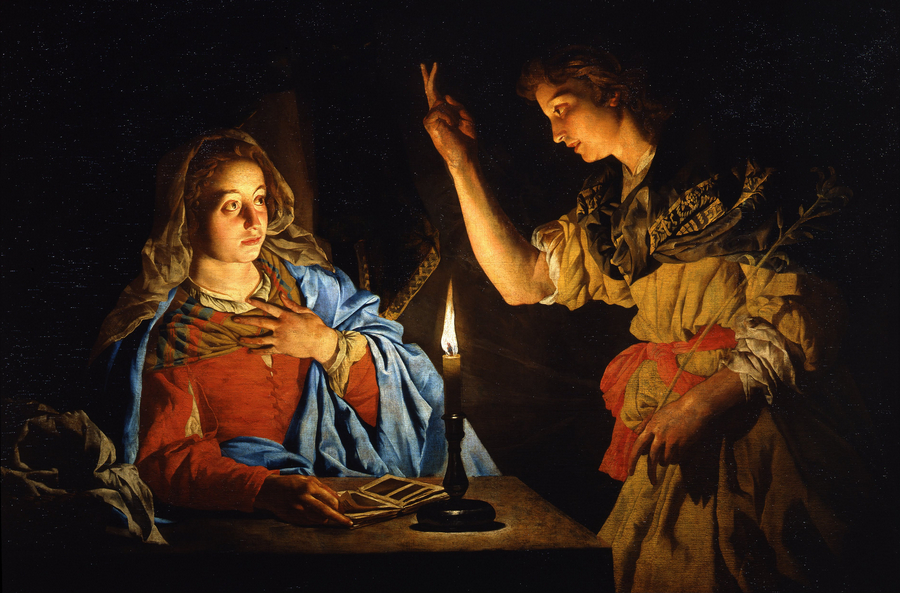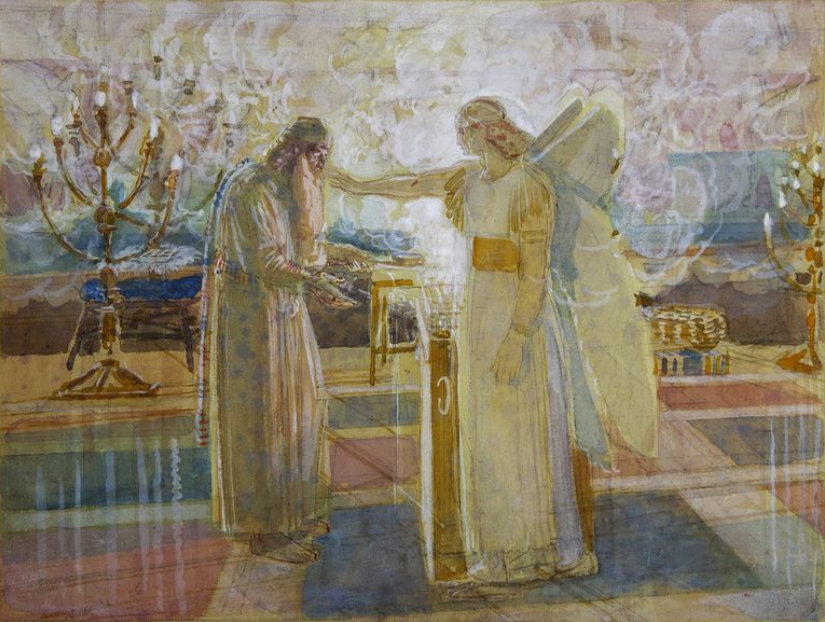
Editor’s note: The following comprises the second chapter, second part, of The Gospel of Luke: An Exposition, by Charles R. Erdman (published 1936). All spelling in the original.
B. The Annunciation to Mary (Luke 1:26-38)
____________________________________________________________________________________
26 Now in the sixth month the angel Gabriel was sent from God unto a city of Galilee, named Nazareth, 27 to a virgin betrothed to a man whose name was Joseph, of the house of David; and the virgin’s name was Mary. 28 And he came in unto her, and said, Hail, thou that art highly favored, the Lord is with thee. 29 But she was greatly troubled at the saying, and cast in her mind what manner of salutation this might be. 30 And the angel said unto her, Fear not, Mary: for thou hast found favor with God. 31 And behold, thou shalt conceive in thy womb, and bring forth a son, and shalt call his name JESUS. 32 He shall be great, and shall be called the Son of the Most High: and the Lord God shall give unto him the throne of his father David: 33 and he shall reign over the house of Jacob for ever; and of his kingdom there shall be no end. 34 And Mary said unto the angel, How shall this be, seeing I know not a man? 35 And the angel answered and said unto her, The Holy Spirit shall come upon thee, and the power of the Most High shall overshadow thee: wherefore also the holy thing which is begotten shall be called the Son of God. 36 And behold, Elisabeth thy kinswoman, she also hath conceived a son in her old age; and this is the sixth month with her that was called barren. 37 For no word from God shall be void of power. 38 And Mary said, Behold, the handmaid of the Lord; be it unto me according to thy word. And the angel departed from her.
_____________________________________________________________________________________
The prediction to Mary of the birth of Jesus is recorded by Luke with marked dignity, delicacy, and reserve. It is an important record. This prediction is the crown of all prophecy and it reveals the supreme mystery of the Christian faith, namely, the nature of our Lord, at once human and divine.
The same angelic being who had spoken to Zacharias speaks again, not now to an aged and distinguished priest amidst the splendors of the Temple in Jerusalem, but to a humble maiden betrothed to a carpenter in an obscure village of Galilee. The angelic salutation, “Hail, thou that art highly favored,” has been translated less accurately, “Hail, thou that art full of grace,” and it has been misinterpreted to encourage the practice of praying to the virgin as divine. It does not mean, however, that Mary was to be a source but rather a recipient of grace; upon her God was bestowing peculiar favor. She may rightly be regarded as the most blessed among women; but only a woman still.
Mary had been startled by so strange an appearance and greeting; now she was further amazed by the announcement, “Thou shalt … bring forth a son, and shalt call his name Jesus.” Before her marriage she was to become a mother, and she was to call her child by that significant name which signifies “Saviour” or “God is Saviour.” “He shall be great,” continued the angel, both in his person, as “the Son of the Most High,” and in his royal power, for “the Lord God shall give unto him the throne of his father David.” This throne of David does not refer to the Christian Church or to merely heavenly or spiritual influence. It is a rule on earth which here is promised, yet it is not to be limited to one nation nor is it to be confined to one age. It is the Kingdom of the Messiah, which is to bring joy to “the house of Jacob for ever” and also to all the nations of the world—“and of his kingdom there shall be no end.”
The exclamation of Mary expressed astonishment but not unbelief: “How shall this be?” Then came the answer which is unsurpassed as a clear and sublime statement of the incarnation, “The Holy Spirit shall come upon thee, and the power of the Most High shall overshadow thee;” the creative power of God was to rest upon Mary as the cloud of glory had rested upon the tabernacle of Israel and as a result the child who would be born should be in reality, and should be called, “the Son of God.” Of the truth of his promise the angel added a sign and proof in the surprising fact that Elisabeth, the aged kinswoman of Mary, was soon to be blessed with a son. This was in fulfillment of a promise made by the same angel messenger, and the marvel in the case of Elisabeth would assure Mary of the certain accomplishment of the gracious and more surprising promise to her. The reply of Mary is probably unequaled in all history as an expression of perfect faith, “Behold the handmaid of the Lord; be it unto me according to thy word.” Thus she revealed belief in the word of God and submission to the will of God. There was no doubt in her mind as to the truth of the divine promise with all that it suggested of miracle and of mystery; and there was no shrinking on her part from all that the fulfillment of this promise possibly might involve of suspicion and shame and reproach and suffering and even death. Those who believe most firmly in the promises of God, submit most patiently to his providences; they see the glory which surely will succeed the gloom. Mary was to become the mother of the Messiah, of the Son of Man, of the Saviour of the world.
(Go back to previous chapter)
(Continue to next chapter)









